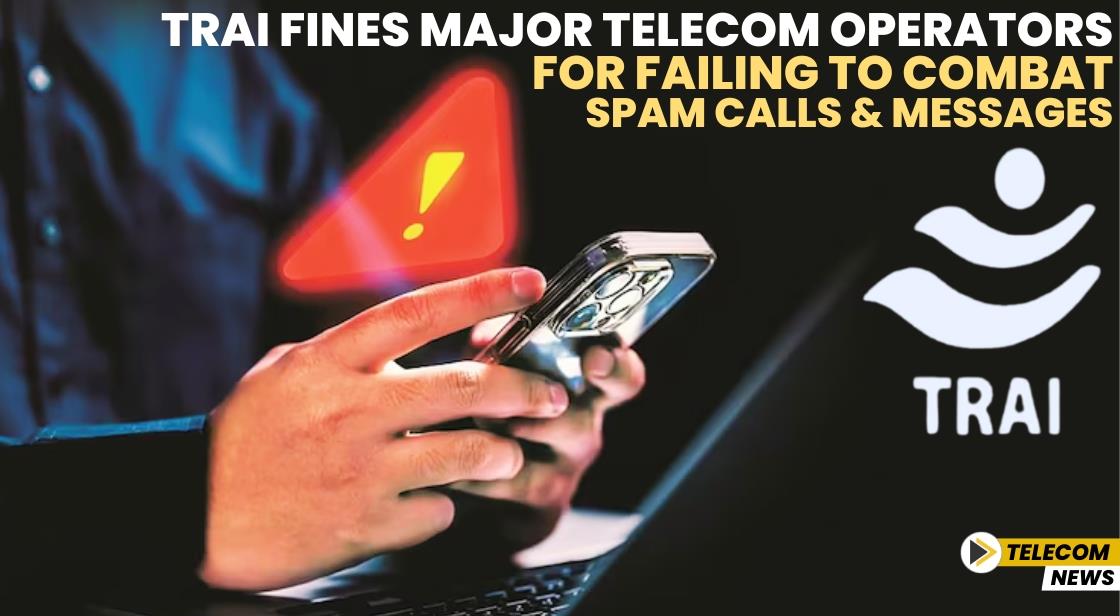TRAI Fines Major Telecom Operators for Failing to Combat Spam Calls and Messages

News Synopsis
The Telecom Regulatory Authority of India (TRAI) has taken stringent action against major telecom operators for their inability to control spam calls and messages, as reported by The Economic Times. Prominent companies like Reliance Jio, Bharti Airtel, Vodafone Idea (Vi), BSNL, and several smaller operators have been penalized under the Telecom Commercial Communication Customer Preference Regulations (TCCCPR).
TRAI's Penalties: A Breakdown
In its latest crackdown, TRAI imposed fines amounting to ₹12 crore. When combined with earlier penalties, the total outstanding dues of telecom companies have surged to ₹141 crore. However, these companies have yet to settle their fines. TRAI has appealed to the Department of Telecommunications (DoT) to recover these amounts by invoking the telecom operators' bank guarantees, but the DoT’s decision remains pending.
Understanding the TCCCPR
Introduced in 2010, the Telecom Commercial Communication Customer Preference Regulations (TCCCPR) aims to shield consumers from unwanted promotional calls and spam messages.
Key Features of TCCCPR:
-
Consumer Control: Customers can block promotional calls and messages.
-
Mandatory Telemarketer Registration: Telemarketers must register with TRAI.
-
Communication Time Restrictions: Limits are placed on when promotional calls and messages can be sent.
-
Penalties: Violators face fines for breaching regulations.
Telecom Operators Defend Their Position
Telecom companies argue that the root cause of spam lies with businesses and telemarketers, not the telecom operators themselves. They emphasize:
-
Unfair Penalties: Operators claim they act only as intermediaries, making the penalties unjust.
-
Investments in Anti-Spam Measures: Companies highlight significant investments in technologies to mitigate spam, though certain entities evade detection and compliance.
Additionally, telecom companies have urged TRAI to extend its spam regulations to over-the-top (OTT) platforms like WhatsApp, banks, and other businesses, as these entities contribute significantly to spam traffic.
TRAI's Future Plans: Enhanced Anti-Spam Measures
TRAI is currently revising and strengthening the TCCCPR framework to better address the growing spam menace. In a recent stakeholder meeting, telecom operators underscored the importance of regulating all participants in the communication ecosystem, including OTT platforms and businesses. They stated that a holistic approach is essential for tackling spam effectively.
Industry Challenges: A Call for Unified Accountability
While TRAI continues to crack down on telecom operators, the industry faces significant challenges in completely eradicating spam. Operators emphasize that collaboration among all stakeholders, including banks, telemarketers, OTT platforms, and consumers, is necessary for a lasting solution.
Conclusion
The TRAI’s imposition of fines on major telecom operators reflects the increasing urgency to tackle spam calls and messages. While the penalties underscore TRAI’s commitment to safeguarding consumers, telecom companies argue that the issue is systemic and requires collective action. With TRAI planning to enhance its regulations and the industry calling for wider accountability, the fight against spam is set to intensify. A balanced, ecosystem-wide approach will be essential to achieve meaningful and lasting results in protecting consumers from spam traffic.
About Telecom Regulatory Authority of India (TRAI)
The Telecom Regulatory Authority of India (TRAI) is the independent regulatory authority overseeing the telecommunications sector in India. Established under the Telecom Regulatory Authority of India Act, 1997, TRAI's primary role is to create and enforce policies and regulations to ensure the growth and fair functioning of the telecom industry while protecting the interests of consumers.
Key Functions of TRAI
-
Consumer Protection
-
Formulates regulations to safeguard consumer rights, such as preventing spam calls and ensuring transparent billing.
-
Provides avenues for addressing consumer grievances.
-
-
Regulation and Standards
-
Develops rules to ensure fair competition and prevent monopolistic practices.
-
Sets quality standards for telecom services, including internet, voice, and broadcast.
-
-
Spectrum Management
-
Advises the government on spectrum allocation to maximize efficiency and revenue.
-
-
Policy Formulation
-
Contributes to policy frameworks like pricing, licensing, and market expansion.
-
Promotes investment and innovation in the telecom sector.
-
-
Monitoring and Enforcement
-
Monitors compliance with regulations and imposes penalties for violations, such as failure to curb spam calls.
-
Notable Achievements
-
Introduction of Mobile Number Portability (MNP): Empowered consumers to switch service providers without changing their mobile numbers.
-
Affordable Data Revolution: Played a role in making India one of the most cost-effective mobile data markets globally.
-
TCCCPR Framework (2010): Addressed issues like spam calls and messages through regulations under the Telecom Commercial Communication Customer Preference Regulations.
TRAI and Emerging Technologies
TRAI actively adapts its regulations to address challenges posed by emerging technologies.
-
5G Rollout: Contributes to creating a robust ecosystem for 5G adoption in India.
-
OTT Platforms: Advocates for extending regulatory frameworks to include over-the-top (OTT) communication services like WhatsApp and Skype.
Structure and Leadership of TRAI
-
Chairperson: Leads TRAI and ensures its objectives align with government policies.
-
Members: Includes experts from telecom, law, and technology to provide balanced perspectives.
Vision of TRAI
TRAI envisions making India a global leader in telecommunications by fostering a competitive, innovative, and consumer-friendly environment while ensuring universal access to quality telecom services.
You May Like









